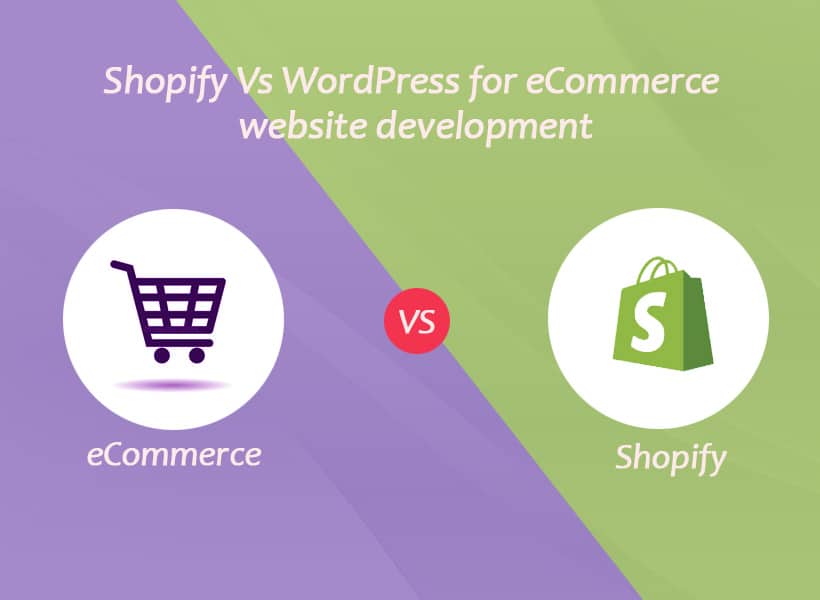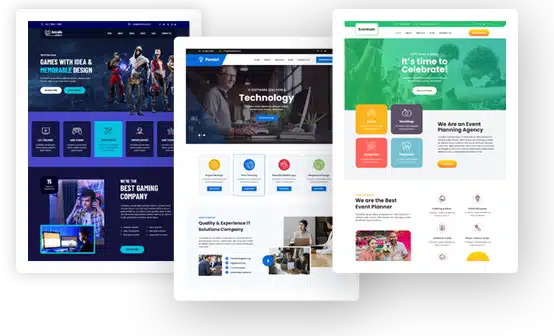Shopify Vs WordPress for eCommerce website development

Thinking of launching your online store, aren’t you? But before you get started, you need to pick the right platform first.
The two most popular options are Shopify and WordPress. However, the question is which one is better for you?
Now let us go through the differences and similarities between the two products so that you can make the right choice.
Overview of Shopify Vs WordPress
Shopify is a simple-to-use eCommerce solution for beginners and small companies.
It is like an already prepared e-commerce package. It’s simple to use with lots of useful features and takes care of the hosting.
It is ideal for people who are either starting or running small-scale businesses.
WordPress is a flexible website builder that runs most of the web. With an amazing tool, WooCommerce, WordPress can be transformed into a robust e-commerce platform.
It is very flexible, allowing you to customize completely and expand your store as much as you wish.
First, why does the platform choice of your eCommerce website matter?
On the platform you choose everything from your website’s functionality and design to its performance and scalability will be determined.
Shopify offers a reliable solution with security features and other apps for additional functionality. However, WordPress allows you to set up and customize your store to suit your needs. When using Shopify, visiting various Shopify store templates can improve the design and functionality of your online store, available specifically to different industries and customer preferences.
However, there is more to consider. You will need to think about things like how much it costs, whether there are any additional fees, how well the plan responds to getting your store noticed online, how helpful the support is, and much more.
Therefore, what is your decision? Which one suits you better – Shopify’s simplicity or WordPress’s customization?
Now, let’s explore each of them in detail and see what works best for your e-commerce business.
Overview of Shopify’s features and capabilities:
Shopify is a great e-commerce platform that offers a range of features that even advanced users can benefit from.
For businesses searching for Shopify web development, it is a good choice and self-sufficient as it offers easily crafted designs, ways, and means of securing the website, managing payments, and markets for you.
It is very simple to put in the orders, take control of inventory management, and determine how well you are selling.
Furthermore, Shopify has a great tool where you can add many more items to the store which will make your online store more profitable.
Advantages of using Shopify for eCommerce:
- Ease of use: Shopify’s user-friendly platform allows anybody to establish and efficiently control a web store with a few clicks.
- All-in-one solution: With Shopify, these concerns go out of the question, all you need to work on is your business growth.
- Professional design: Choose among several beautiful pre-made templates, and you can create a stylish landmark for yourself.
- Reliable support: Shopify prides itself on its 24/7 customer service, so that you may reach them through phone or email regardless of time and day.
- Scalability: Whether you are a startup or a well-established company, Shopify has flexible and appropriate plans for both small and big businesses which are created in line with their level of organization.
Disadvantages of Shopify:
- Monthly fees: Shopify is well-priced as it offers a small basic plan for starters, but keeping your business growing on the platform requires a commitment to recurrent monthly payments.
- Transaction fees: As well as the store fees, Shopify deducts a certain amount for payment fees for every deal that goes through your store, which might significantly reduce your profit margin.
- Limited customization: Shopify does have some customizability through its theme editor and apps work group it probably won’t offer the same level of flexibility as self-hosted WooCommerce solutions like WordPress and woo-commerce.
- Dependency on Shopify: You need to understand the fact that Shopify is a hosted solution. Hence, you’re very much dependent on their platform and it can be a major problem if you struggle with customization and control over your store.
Examples of successful eCommerce websites built on Shopify:
- Gymshark: The fitness clothing brand that started as a Shopify store, and has now developed into a huge global player, generating billions of USD in revenue.
- Allbirds: A sustainable shoe brand that has become very popular for its comfortable shoes, has set up its online shop on Shopify and the store is gaining great followers.
- Kylie Cosmetics: Store, the makeup brand of Kylie Jenner, capitalizes on the Shopify platform to sell her best-selling beauty products to a huge number of shoppers around the world.
Overview of WordPress as a CMS for eCommerce:
Initially, WordPress was just a simple blogging platform, now it has become a multiple-purpose content management system (CMS) that enables the creation of an eCommerce website.
Its friendly UI and its high level of customization are what make it a favorite tool for businesses to open online.
Using plugins like WooCommerce, WordPress becomes an eCommerce platform with good capacities, and users can easily create, manage, and increase their online stores.
The flexibility, ability to scale and many community supporters call WordPress suitable for eCommerce projects of all levels.
Advantages of Using WordPress for eCommerce:
- Cost-Effective:
WordPress is free which eliminates the subscription fees for other online platforms.Thus, you save money. Having to pay for hosting, and a domain name are the only other expenses you’ll incur, which will help you control and keep your overall costs low.
- Highly Customizable:
Firstly, WordPress gives massive scope for various adjustments.You need not bother about the aesthetics like the feel, looks, and design of your website as it can be readily personalized to match your brand’s identity.
This is not so widespread on Shopify compared to the specialized platforms.
- SEO Friendly:
WordPress likes its very own search engine-friendly platform that renders your web store a better chance of showing up in a higher position in the search results list.Looking at how you react to these comments can have a great impact on your sales as you might see more people coming to shop in your store or making bulk purchases without spending an extra dime on advertising.
- Open-Source Community:
In the wide community of WordPress users, you will meet several people seeking knowledge, new resources, and help on the way.In case you run into problems, there is a big chance that somebody during their stint has encountered the same difficulty, and he can help you find the right way out.
- Content Marketing Power:
WordPress is versing in blogging content creation such as blog posts and articles.The fact is that you can include this content right into the online store and get your customers more involved in the process which will lead to their purchases.
- Scalability:
With WordPress powering your business, you can grow with it as you expand.There will be an opportunity to enhance and expand the scope of the e-commerce store through the integration of additional features and tools to suit your evolving product range and customers.
Disadvantages of Using WordPress for eCommerce:
- Steeper Learning Curve:
Unlike Shopify, WordPress has a diffusion level, and it requires technical knowledge compared to Shopify’s drag-and-drop interface.The whole plugin and theme management along with the security updates may become a learning curve for those new to the platform.
- Security Concerns:
Being an open source, WordPress requires keeping security tightening through regular updates and strong passwords. Since Shopify takes most of the security aspects, you have nothing to worry about. - DIY Maintenance:
You’ll oversee keeping up your WordPress website by implementing backups, installing the latest updates, and solving any possible troubleshooting problems.Shopify is generally more silent in this regard since it offers automatic management.
- Plugin Reliance:
Although plugins are highly customizable, having too many plugins can ossify your website or create compatibility bugs. The choice and monitoring of plugins must be proper. - Transaction Fees:
However, while WordPress is free, transaction charges are imposed on payment processing like Shopify.This fee depends on the payment gateway used and ranges from platform to platform.
Showcase of Popular eCommerce Websites Powered by WordPress/WooCommerce:
- MVMT:
The hip fashion watch and accessories brand MVMT utilizes WordPress/WooCommerce to showcase its minimalist design as well as provide a clear and simple shopping process for its international customers. - Beardbrand:
Like most men’s grooming brands, Beardbrand uses WordPress/WooCommerce to display its range of products and accessories online via a user-friendly e-commerce platform, centering on its niche audience.Overall, Both Shopify and WordPress had their Pros and cons. It’s up to you what suits your requirements.
To get more clarified here is the breakdown of Cost in terms of specifications.
Cost Comparison between Shopify and WordPress:
| Aspect | Shopify | WordPress/WooCommerce |
| Platform Cost | Monthly subscription fees starting from $29 | Free (WordPress) |
| per month for Basic Shopify plan | ||
| Themes and Plugins | Limited selection of free themes and plugins, | Wide range of free themes available, |
| with premium options starting from $140 | premium themes and plugins vary in cost | |
| depending on features and customization | ||
| Additional Expenses | Domain registration (around $10-$20 per year), | Domain registration (around $10-$20 per |
| transaction fees (varies based on payment | year), hosting (starting from $3.95 per | |
| gateway, ranging from 2.9% + 30¢ to 2.4% + 30¢) | month), transaction fees (dependent on | |
| payment gateway, typically around 2.9% + | ||
| 30¢ per transaction) |
Please note that the mentioned prices are merely a rough estimate and may change based on the required special features that need to be added to the website.
The identification and comparison of different pricing plans and options is a mandatory step before making a final decision.
Still in doubt? whether to choose Shopify or WordPress
Here are some recommendations based on analysis.
Recommendation to Choose:
- For those aiming to start their business or individual as soon as possible, Shopify is the best e-commerce platform that eliminates all troubles.
- If you must make your site look just like your design needs to or want to have more control over how your website works, then you need to use WordPress and WooCommerce.
- In the final analysis, the best platform for your e-commerce website will depend on your business needs and goals that are specific to you only.
- Evaluate all your alternatives, identify what will work best for your online store vision, and pick the host or platform that you think will best serve your purpose.
Finally,
Shopify and WordPress can be considered as decent choices for creating an eCommerce website of all sizes.
If you want a convenient and comprehensive solution that self-configures and does not require significant management, you can use Shopify.
Furthermore, if you crave flexibility, control, and the ability to creatively customize your site, WordPress should be your option.


